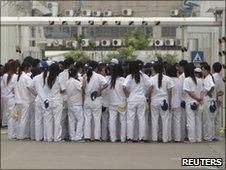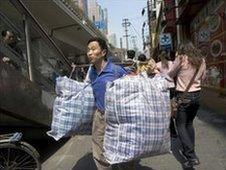China PM praises migrants but makes no promises on pay
- Published

Workers at the Honda Lock factory in Guangdong province return to work
China's Premier Wen Jiabao has called for better living conditions for migrant workers from rural areas.
He said China owed them its wealth and tall buildings, and officials should treat them as their own children. The comments follow a wave of strikes and labour-related suicides.
Up to 200 million Chinese workers have migrated from the countryside to the cities in recent years.
But the government has refused to relax the system of residence permits.
Mr Wen made his remarks as workers at a Honda factory returned to work after a week-long strike over pay.
No pay promise
"The government and all parts of society should treat young migrant workers as they would treat their own children," Mr Wen said.
He promised to improve public facilities in the countryside, like schools and hospitals, so that migrant workers would have less to worry about in their hometowns.

Migrant worker arrives in Shanghai, one of millions to leave the country
The labour disputes at factories in the Chinese industrial belt have raised fears that migrant workers are becoming restless about tough working conditions and curbs on pay.
Strikes are illegal in China but the government seems to be tolerating the recent walkouts at Honda suppliers and other firms, as long as the disputes are settled quickly and quietly, says the BBC's Chris Hogg in Shanghai.
In the past five months, 10 Chinese employees of the IT manufacturer Foxconn have committed suicide. Three more have attempted to take their own lives.
Foxconn, the world's largest maker of computer components, supplies brands such as Apple, Nokia and Dell.
It is not unusual for Mr Wen to speak out in favour of the low paid or those from the countryside who come to the cities seeking work, our correspondent says.
But in light of the recent unrest, Mr Wen's comments will be seen in China as an effort to calm them, he adds.
Mr Wen did not address the most common complaint of the different groups of striking workers that their pay is too low.
However, his words send a signal to government officials that they must pay greater attention to the needs of the migrant workers.
- Published13 June 2010
- Published9 June 2010
- Published7 June 2010
- Published27 May 2010